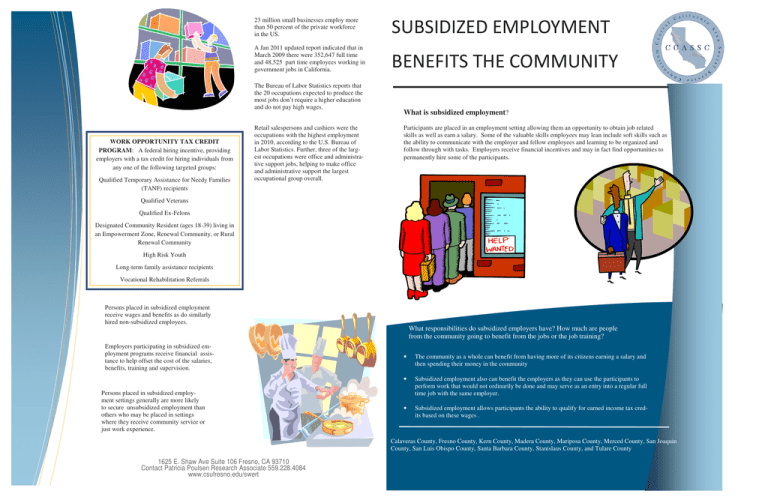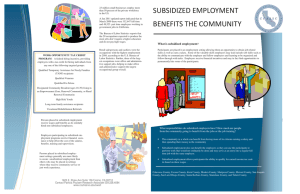SUBSIDIZED EMPLOYMENT
advertisement

23 million small businesses employ more than 50 percent of the private workforce in the US. SUBSIDIZED EMPLOYMENT A Jan 2011 updated report indicated that in March 2009 there were 352,647 full time and 48,525 part time employees working in government jobs in California. BENEFITS THE COMMUNITY The Bureau of Labor Statistics reports that the 20 occupations expected to produce the most jobs don’t require a higher education and do not pay high wages. WORK OPPORTUNITY TAX CREDIT PROGRAM: A federal hiring incentive, providing employers with a tax credit for hiring individuals from any one of the following targeted groups: Qualified Temporary Assistance for Needy Families (TANF) recipients Retail salespersons and cashiers were the occupations with the highest employment in 2010, according to the U.S. Bureau of Labor Statistics. Further, three of the largest occupations were office and administrative support jobs, helping to make office and administrative support the largest occupational group overall. What is subsidized employment? Participants are placed in an employment setting allowing them an opportunity to obtain job related skills as well as earn a salary. Some of the valuable skills employees may lean include soft skills such as the ability to communicate with the employer and fellow employees and learning to be organized and follow through with tasks. Employers receive financial incentives and may in fact find opportunities to permanently hire some of the participants. Qualified Veterans Qualified Ex-Felons Designated Community Resident (ages 18-39) living in an Empowerment Zone, Renewal Community, or Rural Renewal Community High Risk Youth Long-term family assistance recipients Vocational Rehabilitation Referrals Persons placed in subsidized employment receive wages and benefits as do similarly hired non-subsidized employees. What responsibilities do subsidized employers have? How much are people from the community going to benefit from the jobs or the job training? Employers participating in subsidized employment programs receive financial assistance to help offset the cost of the salaries, benefits, training and supervision. Persons placed in subsidized employment settings generally are more likely to secure unsubsidized employment than others who may be placed in settings where they receive community service or just work experience. • The community as a whole can benefit from having more of its citizens earning a salary and then spending their money in the community • Subsidized employment also can benefit the employers as they can use the participants to perform work that would not ordinarily be done and may serve as an entry into a regular full time job with the same employer. • Subsidized employment allows participants the ability to qualify for earned income tax credits based on these wages . Calaveras County, Fresno County, Kern County, Madera County, Mariposa County, Merced County, San Joaquin County, San Luis Obispo County, Santa Barbara County, Stanislaus County, and Tulare County 1625 E. Shaw Ave Suite 106 Fresno, CA 93710 Contact Patricia Poulsen Research Associate 559.228.4084 www.csufresno.edu/swert On February 17, 2009 the American Recovery & Reinvestment Act of 2009 (ARRA) was enacted by Congress and passed into law. ARRA established the Emergency Contingency Fund (ECF) to provide federal funding for specific benefits including subsidized employment . The California Department of Social Services (CDSS) reports that subsidized employment was provided to over 47,000 Cal WORKS and other low-income families through the Temporary Assistance for Needy Families (TANF) ECF that ended on September 30, 2010. There were 260.000 persons placed in jobs subsidized by ECF in the US per the Center on Budget and Policy Priorities. Calaveras County Numbers of persons placed into subsidized slots: 1 Number of employers who accepted placements: 1 Number of persons retained by those employers into regular employment slots: 1 Kings County: Numbers of persons placed into subsidized slots: 116 Number of employers who accepted placements: 71 Number of persons retained by those employers into regular employments slots: 35 San Joaquin County Numbers of persons placed into subsidized slots: 287 Number of employers who accepted placements: 45 Number of persons retained by those employers into regular employment slots: 100 Types of jobs: General warehouse, pressure washer, forklift operator, general labor, and clerical were the most prevalent jobs. Madera County Numbers of persons placed into subsidized slots: 23 Number of employers who accepted placements: 7 Number of persons retained by those employers into regular employment slots: 2 Mariposa County: Numbers of persons placed into subsidized slots : 44 Number of employers who accepted placements : 12 Number of persons retained by those employers into regular employment slots : 8 Businesses involved included real estate , automotive parts , hardware, and a local hospital. Santa Barbara County: Number of persons placed into subsidized slots: 373 Number of persons retained by employers into regular employment slots : 38 Number of employers who accepted placements: 25 Businesses involved included various county departments, vocational training center, health clinic, city parks department, and day care centers San Luis Obispo County: Number of participants placed into subsidized slots : 107 Number of employers who accepted placements: 65 Number of persons retained by those employers into regular unsubsidized employment slots: 59 Kern County: Number of persons placed into subsidized slots: 121 Number of employers who accepted placements: 34 Number of persons retained by those employers into regular employment slots.: 27 Types of jobs: warehouse, cashier, clerical, IT technician, leasing agents, machine operators, and maintenance Merced County: Number of persons placed into subsidized slots: 164 Number of employers who accepted placements: 74 Businesses involved: government, retail, food service, and education. Fresno County: Number of persons placed into subsidized slots: 2,518 Number of employers who accepted placements: 527 Number of persons retained by those employers into regular employment slots: 813 Types of jobs: agriculture, administration, manufacturing, Construction, and retail Stanislaus County: Number of persons placed into subsidized slots: 761 Number of employers who accepted placements: 162 Types of jobs: Clerical, warehouse, food service, retail, Park aides, and automotive Tulare County: Number of persons placed into subsidized slots: 877 Number of employers who accepted placements: 324 Numbers of persons retained by those employers into regular employment slots: 166 EMPLOYERS STORIES David Martinez, of the Dollar Store in Hanford, CA states that it was a good experience having participated in the subsidized employment program. He said initially he decided to become involved in the program as it essentially provided free help. He said the retail business always needs extra help. Several of the participants worked as cashiers. He did say that although some did not work out several persons were in fact hired. He said they were hired due to their own work ethic and merit. He said one person was actually promoted to an assistant manager. Mike Greenberg, operator of Cold Stone Creamery, Merced, CA. said if he were to rank the Subsidized Employment program he would give it a 10! He stated that Merced County contacted him about participating in the program. He decided that it was an opportunity to obtain some help and he would not have to risk anything for a trial period. He stated that like regular employees, he has found that an employer must be patient. He said he must go through many individuals before finding someone worthwhile. He said this can be a challenge for the employer. He said that he treated the subsidized employees as a regular employee. He did state that he regularly hired kids but found that the subsidized employees have more life experiences. He did hire one person who is a great asset to the business and provides good customer service. He said the subsidized employment program was a great program and was helpful in motivating people to come to work. Carol Record owner of Record’s Sierra Stationers in Mariposa, CA. had 3 different placements and 1 person is still employed part time. Carol states that this employee “has brought life back into my store. Customers like her and we like her.” Carol’s small business sells office supplies and stationary and it does printing jobs for customers and UPS deliveries.



